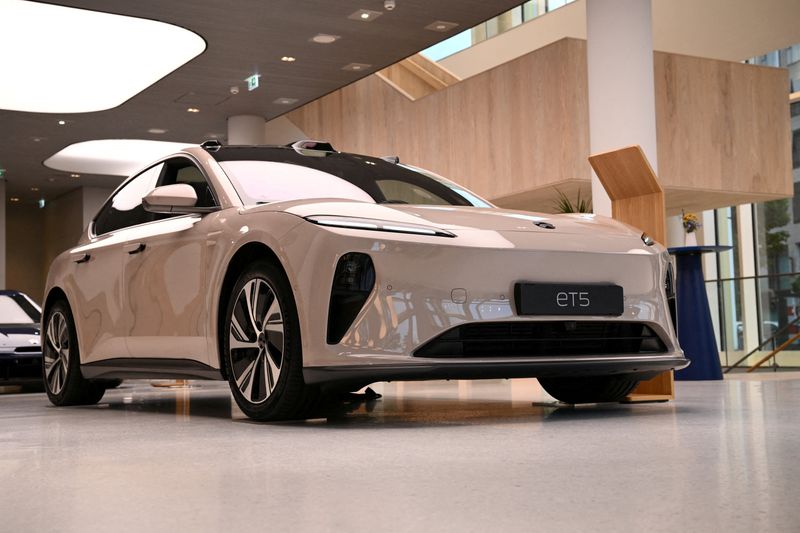By Brenda Goh
SHANGHAI (Reuters) - The European Commission began investigating on Wednesday whether to set punitive tariffs to protect its producers from imports of cheaper Chinese electric vehicles that it says benefit from state subsidies.
Here are the big questions about the move, which led to a slide in shares of Chinese EV makers on Thursday:
WHY EXPORT TO EUROPE AND HOW MUCH HAS IT GROWN?
A key driver for their push abroad has been slowing demand in China that has exacerbated overcapacity.
Bill Russo, CEO of Shanghai-based advisory firm Automobility, has estimated that China has excess auto capacity of about 10 million vehicles a year, the equivalent of two-thirds of all North American output in 2022.
Europe has become a key export market for Chinese auto brands, helped by the bloc's strict rules on emissions and Beijing's relatively benign trade ties, in contrast with rising tension with the United States.
Chinese new energy vehicle shipments to the EU jumped 112% in the first seven months of 2023 on the year and 361% from 2021, customs data shows.
The European Commission said China's share of EVs sold in Europe has risen to 8% and could reach 15% by 2025.
WHY ARE CHINA-MADE EVS CHEAPER?
China produces EVs more cheaply than anywhere else.
That is mainly due to Beijing's decade-old industry promotion policy of incentives and subsidies that enabled China to become the world's biggest EV market and control the global EV supply chain, including raw materials.
EVs made in China are typically a fifth cheaper than EU-made models, the European Commission says.
The policy has also spawned industry heavyweights such as the world's biggest EV battery maker CATL and BYD (SZ:002594) which replaced Volkswagen (ETR:VOWG_p) this year as China's best-selling car brand.
China's cost and supply chain advantages have drawn foreign companies to manufacture there.
The best known of these is Tesla (NASDAQ:TSLA), whose giant plant in Shanghai churned out more than 700,000 vehicles in 2022, or half the U.S. automaker's total output. Renault (EPA:RENA) and BMW (ETR:BMWG) also build cars for export in China.
WHO IS THE EU'S INVESTIGATION TARGETING?
The EU's anti-subsidy investigation covers battery-powered cars from China, so it also includes the non-Chinese manufacturers there.
The single largest exporter is Tesla, accounting for 40% of China's EV exports between January and April, U.S. thinktank the Center for Strategic and International Studies says.
Popular Chinese brands exported to Europe include Geely's Volvo (OTC:VLVLY) and state-owned automaker SAIC's MG.
Other companies such as market leader BYD, Nio (NYSE:NIO) and Xpeng (NYSE:XPEV) have also started expanding to European countries, including the Netherlands and Denmark.
WHAT SUBSIDIES HAVE BEEN ROLLED OUT?
Chinese state subsidies for electric and hybrid vehicles totalled $57 billion between 2016 and 2022, consultants AlixPartners have estimated.
China's best-known EV subsidy programme aimed to spur purchases. Paid to the automaker at the point of purchase, the subsidy began in 2009 and was scaled back gradually to end last year.
It paid out nearly $15 billion to encourage EV purchases through 2021, China Merchants Bank International has estimated.
In June, China unveiled a package of tax breaks worth 520 billion yuan ($72 billion) over four years aimed at boosting sales of EVs and other green cars.
Many local authorities continue to offer separate aid or tax rebates to attract manufacturing investment, as well as consumer subsidies. These have grown in recent years as the economy slows.
The EU said its investigation targets a broad range of possible unfair subsidies, from prices for raw materials and batteries, to preferential lending or cheap provision of land.
